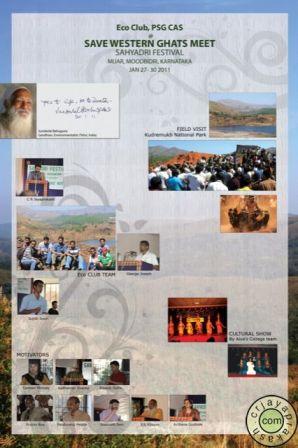/regions/political
Political
MGNREGA completes 5 years - PIB Release
Posted on 03 Feb, 2011 01:34 PMAddressing a large gathering at Vigyan Bhawan on this occasion in New Delhi, the Prime Minister Dr. Manmohan Singh called upon the states to strengthen the Gram Sabhas for rural empowerment. He said the Ministry of Rural Development and Ministry of Panchayati Raj has jointly chalked out a plan to strengthen the Panchayats. Technical Units will be set up in Gram Panchayats and to improve the managerial efficiency every unit will have a Panchayat Development officer and one Junior Engineer. Focus would be on Left Wing Extremism(LWE) affected districts and the districts where more than Rs.100 crore have been spent under MGNREGA.
Conjunctive use of surface water and ground water - Lecture delivered by Dr. R. Jagadiswara Rao at National Water Academy, Pune
Posted on 03 Feb, 2011 12:09 PM
Dr. R. Jagadishwara Rao
Former Professor of Geology
Sri Venkateswara University
Tirupati, AP 517502
Permaculture Designers Course, 1st - 14th April, 2011, Sambhav, Odisha
Posted on 03 Feb, 2011 11:07 AMOrganizer: Permaculture Association of India
Venue: Sambhav, Rohibanka, Nayagarh district, Odisha, India
Topics:
- Introduction-The Permaculture Principles and Ethics
- Principles of Natural Systems,understanding patterns in nature and design
- Pattern In Design-Cultivated Systems: zones and sectors, micro-climate, plants and animals
- Natural Systems: climate, landforms,water, forests and trees
"Recommendations on water and sanitation services to urban poor"
Posted on 02 Feb, 2011 05:31 PMThe India WASH Forum newsletter for January 2011. It is an open platform for engagement on contemporary issues, for an independent credible voice in the water, sanitation and hygiene sector.
- Recommendations on water and sanitation services to urban poor
The group came up with a list of prioritised issues that need immediate attention if the urban poor were to be provided with sustainable and equitable water and sanitation services. - Water resources are under stress of depletion as well as denial of access for the poor
Drinking water needs are met primarily from ground water. Except for the large metros that suck away water from rivers, most small towns in India depend on ground water supply.
"Urban sanitation in India: life after Common Wealth Games"
Posted on 02 Feb, 2011 05:16 PMThe India WASH Forum newsletter for November 2010. It is an open platform for engagement on contemporary issues, for an independent credible voice in the water, sanitation and hygiene sector.
- Recent estimates of drinking water and sanitation status of India
As per the estimate, India has achieved a coverage of 68% rural population having access to an individual household toilet. - Urban sanitation in India: life after Common Wealth Games
The Commonwealth Games generated a media blitz recently. Unfortunately, instead of highlighting the sorry state of sanitation in India, the issue was trivialized in the media.
Millet Mela, Sahaja Samrudha, 5th - 6th Feb, 2011, Gandhi Bhavan, Bangalore
Posted on 02 Feb, 2011 04:44 PMTheme: Meet the Millet! Say hello to HEALTH
Organizer: Sahaja Samrudha
Venue: Gandhi Bhavan, Bangalore
MSW graduates required for data collection on watershed
Posted on 02 Feb, 2011 03:25 PMForwarded to the portal by: L.C.Nagaraj
We have taken up evaluation of 65 water sheds in Northern districts of Karnataka. These water sheds are spread across Bagalkot,Raichur, Koppala, Bellary and Davanagere districts.
A report on Save Western Ghats Meet held at Moodbidri, Mangalore between 27th -30th January 2011
Posted on 02 Feb, 2011 03:11 PM
Wastewater Management India, IQPC, 23rd - 26th May 2011, New Delhi
Posted on 02 Feb, 2011 10:27 AMOrganizer: International Quality and Productivity Center(IQPC)
Venue: The Grand New Delhi, India
Topics:
- Understanding guidelines and discovering new investment opportunities in the wastewater sector in India
- Re-engineering existing wastewater management systems
Groundwater flow modelling and aquifer vulnerability assessment in Yamuna–Krishni sub-basin of Muzaffarnagar district – A study by Central Ground Water Board and Aligarh Muslim University
Posted on 02 Feb, 2011 08:24 AMThis report by Aligarh Muslim University and Central Ground Water Board (CGWB) deals with groundwater flow modelling and aquifer vulnerability assessment in Yamuna–Krishni sub-basin of Muzaffarnagar district. For evaluation of the groundwater resources and for minimizing the error of estimation, the system has been evaluated through aquifer modelling where water balance is established using partial differential equation of groundwater flow and is solved with boundary and initial boundary conditions.